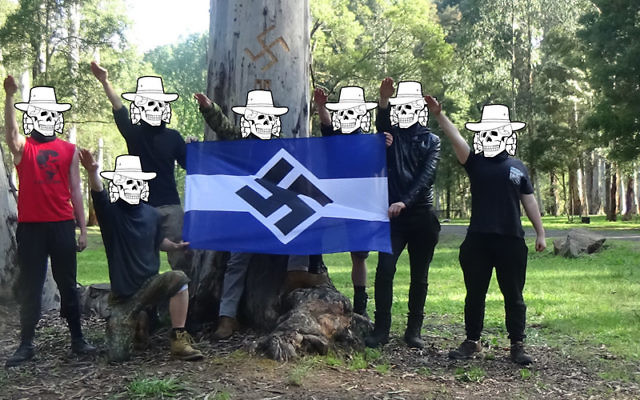Anti-Semitism on the rise in Australia
The 2017 Report on Anti-Semitism in Australia released by the Executive Council of Australian Jewry reveals a 10 per cent rise in anti-Semitic incidents reported nationally.
“WHERE are your striped pyjamas?”
It was the question that pre-empted a vicious anti-Semitic assault upon a Jewish school student on a public bus in Sydney earlier this year. The attacker spat on the victim before kicking and punching him in the chest.
This is just one of 230 incidents reported nationally in the past 12 months, documented in the 2017 Report on Anti-Semitism in Australia released by the Executive Council of Australian Jewry (ECAJ).
The report notes an increase of anti-Semitic incidents in Australia by almost 10 per cent – ranging from physical assaults, abuse and harassment; to vandalism, graffiti, hate and threats communicated directly by email, letters, telephone calls, and leaflets.
And that is in addition to the 10 per cent increase from the previous year.
“That in itself is of concern,” Julie Nathan, ECAJ research officer and author of the report, told The AJN.
NSW recorded the highest number of incidents, 43 per cent of the total tally, followed by Victoria, 34 per cent, and Queensland, nine per cent.
While the number of “attacks” remain relatively unchanged, “threats” of anti-Semitism have increased markedly by 39 per cent – due mainly to an increase in anti-Semitic graffiti and posters.
“The most prominent change over the last 12 months in Australia has been the rise in extreme right-wing activity,” said Nathan.
Neo-Nazi group Antipodean Resistance was responsible for almost one quarter of the posters and stickers reported. Formed in October 2016, the group originates in Melbourne but has since spread across most states.
Nathan revealed that Antipodean Resistance has been involved in posting “thousands” of Nazi stickers and anti-Jewish, anti-homosexual and pro-Nazi posters, “especially at universities and other places visible to the public”.
“Some of the Antipodean Resistance posters express support for violence and murder, calling to “Legalise the execution of Jews” and for the killing of homosexuals, by shooting Jews and homosexuals in the head,” explained Nathan.
The white supremacist group has an online and social media presence, but the identities of their members are guarded.
In all photos posted on the group’s website, the faces of members are covered by a graphic bearing stark resemblance to the “death’s head” insignia of the Nazi SS Totenkopfverbande unit.
While Antipodean Resistance issue an online monthly action report, the activities described remain vague, including hikes and camps, for “training” where “white men learn how to defend themselves and their families”, in “a space for National Socialists to talk openly about their beliefs”, as they burn “enemy propaganda”.
At this stage, ECAJ has deemed Antipodean Resistance as a “serious concern rather than a solid threat”.
However, “It is very sobering that 70 years after the Shoah, the Jewish leadership and community are facing calls to execute Jews by Nazis,” Nathan added.
But it is indicative of a global trend. Earlier this month, the US Anti-Defamation League (ADL) released data which saw a 67 per cent increase in anti-Semitic incidents between January 1 and September 30 of this year – a number which already exceeded the total number of incidents for the entirety of 2016.
Similarly, white supremacist groups pose the dominant threat, with a staggering 182 per cent spike in anti-Semitic incidents across the US in the aftermath of the Charlottesville rally.
“Every single day, white supremacists target members of the Jewish community,” said ADL CEO and national director, Jonathan Greenblatt.
But while incidents of harassment have more than doubled in the US in the first three quarters of 2017, as opposed to the same period of 2016; there has been a slight decrease in anti-Semitic harassment in Australia over the past 12 months – despite continuing to rank overall, as the category with the highest number of anti-Semitic incidents.
As a Jewish man was leaving shule two months ago in Melbourne, a driver pulled up in his car, got out and unleashed a tirade of abuse. The man was forced to flee back into the synagogue.
Pages of the report detail 75 other instances of a similar story – a Jewish person who is coming or going to synagogue, only to be verbally attacked by a passing driver.
ECAJ urged: “For a diverse society such as Australia’s to be socially cohesive, it is imperative that those in positions of influence within Australia publicly condemn anti-Semitism and other forms of racism, and support legal and other measures to counter all forms of racism, especially those which involve violence or advocacy of violence.”
Should you experience anti-Semitism or witness suspicious activity, call the CSG hotline on 1300 000 CSG (274).
REBECCA DAVIS


comments